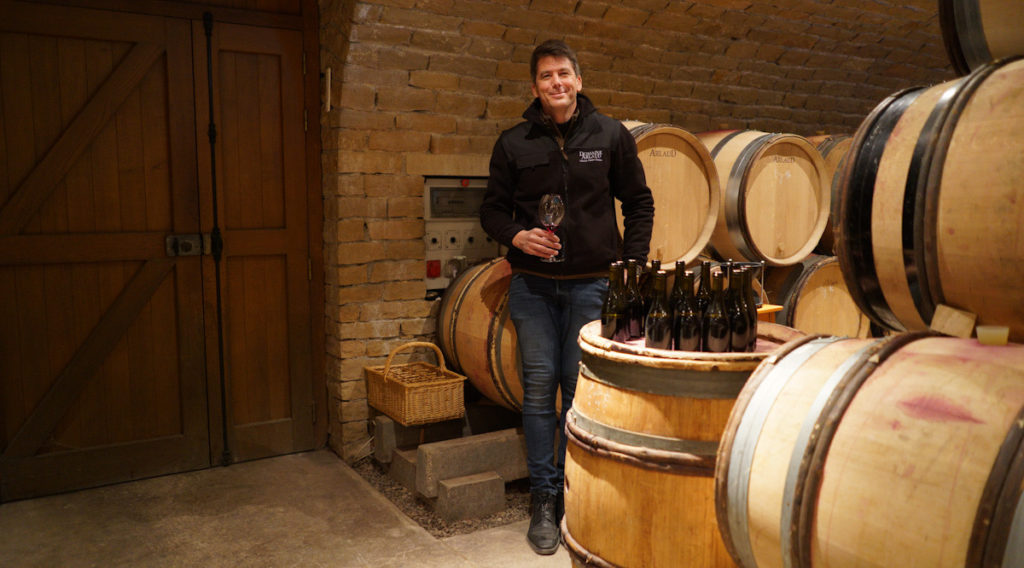Domaine Arlaud is producing some magnificent wines, and year by year the connoisseur’s awareness of them increases.
Arlaud is both organically and biodynamically certified, and despite the slowly but surely increasing renown of this estate, it is still somewhat under the radar. How long will that last?
The low-key domaine is located in a relatively new building east of the RN974, away from the main part of Morey-Saint-Denis, and just a short Brompton ride from Nuits-Saint-Georges.
Domaine Arlaud is, as mentioned, certified both BioDyvin and Agriculture Biologique (AB). It has had its biodynamic status since 2014.
A bit about Domaine Arlaud
Arlaud is a relatively new estate by Burgundian standards. It was established just after World War II by Joseph Arlaud, who was originally from the Ardèche, and who married a local Morey girl, Renée Amiot. As a wedding gift they got some vineyards from her family, and Joseph expanded the holding in 1949. In the beginning he was not a full-time vigneron, but from 1970 he focused entirely on the estate. His son Hervé succeeded him in 1982, and expanded the domaine further. In 2004 they took over vineyards from Guy Coquard – a fermage/metayage agreement – and the estate grew to 15 ha with this significant addition.
In 2004, Hervé Arlaud was joined by his three children, and together they refined the quality of the wines and began to work organically and biodynamically in the vineyards. From 2013, the younger generation has fully taken over, and Cyprien Arlaud (born in 1976) is now in charge of the estate.
Tasting notes from March 8
The 2019s were bottled in December, so they had had plenty of time to settle down before I visited last month.
The Bourgogne Roncevie 2019 is the perfect introduction to the Arlaud line-up. It’s produced in Gevrey-Chambertin, coming from a parcel just outside the Gevrey appellation that produces 29,000 bottles annually. On the palate there is tremendous freshness and complexity for this level – very zappy red fruit with fine mid-palate tension. Redcurrant and sweeter forest berries complete this cuvee. What a bargain!
(Drink from 2021) – Good (87p) – tasted 08/03/2021 – ![]()
The Morey-Saint-Denis 2019 is a step up in concentration, and just a notch darker in the fruit. It is quite airy and fresh on the mid-palate, with layers of red fruit to please your senses. There is delightful focus, and this is indeed a vin de soif, despite its slight reduction and perhaps slightly reserved expression.
(Drink from 2027) – Very Good (88-89p) – tasted 08/03/2021.
The Chambolle-Musigny 2019 is a lovely, fresh village from four lieux-dits: Les Bussières, Les Chardannes, Les Herbues and Les Gammaires in the northern part of the appellation. The bouquet is offering juicy, expressive fruit; it’s light-footed and vivacious, and a hedonistic treat.
(Drink from 2028) – Very Good (88-90p) – tasted 08/03/2021 – ![]()
The 1ers crus of Morey-Saint-Denis are a bit overlooked, so it is always a treat to taste three different ones at Domaine Arlaud.
The Morey-Saint-Denis Les Millandes 2019 is a lovely, organic wine from a plot just below Clos de la Roche. The nose is brimming with energetic red and dark fruits and a rather earthy minerality. On the palate, it’s rich and vivacious – not the most complex of 1ers crus, but quite refined nevertheless.
(Drink from 2032) – Fine (90-91p) – tasted 08/03/2021 – ![]()
From the northern end of the appellation on the border with Gevrey-Chambertin we find the Morey-Saint Denis Aux Chezeaux 2019. The bouquet is brimming with vivacious red fruit, along with some cloudberry hints and lilac. On the palate, this is energetic, zappy and very juicy, with delightful tension between ripe, rich fruit and the fresher redcurrant and pomegranate notes.
(Drink from 2032) – Fine+ (91-93p) – tasted 08/03/2021 – ![]()
You need to login as a Premium subscriber to read the rest of this article. If you are not a Premium Subscriber, use the subscribe function and sign-up.


 - A true vin d’émotion – a Burgundy of passion
- A true vin d’émotion – a Burgundy of passion - A truly hedonistic wine – lively and enjoyable
- A truly hedonistic wine – lively and enjoyable - A vivacious wine for pure indulgance
- A vivacious wine for pure indulgance - A potential vin d´émotion - frais et léger
- A potential vin d´émotion - frais et léger